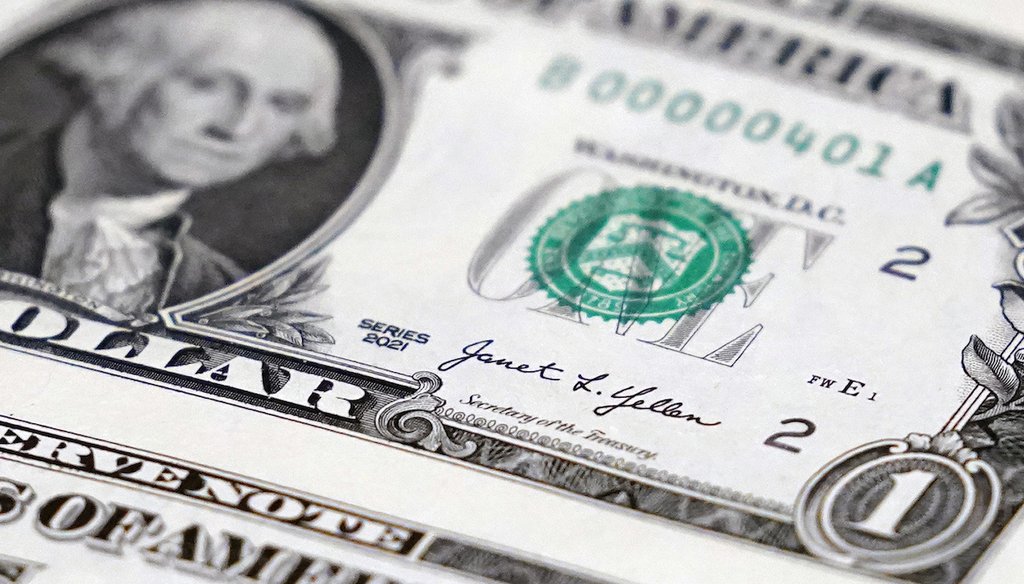Stand up for the facts!
Our only agenda is to publish the truth so you can be an informed participant in democracy.
We need your help.
I would like to contribute

Secretary of the Treasury Janet Yellen's signature is shown on a newly printed sheet of bills on Dec. 8, 2022. (AP)
On Jan. 19, the United States officially hit its legal debt limit of almost $31.4 trillion. Over the next few months, the Treasury Department will be able to shift money around to buy time, but sooner or later, unless the limit is raised or suspended, the country risks defaulting on its debts.
With members of the new House Republican majority saying they want spending cuts included in any bill that raises the debt limit — and with the White House saying it will not negotiate — the door is open to an unprecedented U.S. default.
Failure to agree on a higher limit would have big economic implications for ordinary Americans, the U.S. economy and the rest of the world.
What is the debt, and what is the debt limit?
Every year, the federal government runs either a surplus or a deficit in its accounts. When there’s a surplus, it means that more money came in that year than was spent. When there’s a deficit, it means that more money was spent than came in. When there’s a deficit, the government must borrow money to make up the difference.
The government debt is the cumulative total that the government has borrowed to cover all those deficits and hasn’t yet paid back.
The debt limit, sometimes called the debt ceiling, approximates the credit limit on a credit card. It’s a dollar figure that constrains how much debt the federal government can carry at a given time to pay for its operations. The limit is legal, not financial, so it doesn’t necessarily reflect how much debt the government can afford to carry based on the economy’s strength.
If the limit isn’t raised or suspended, the United States cannot cover its bills — not just checks to older Americans, veterans and federal employees but also payments to bondholders, a development that could ripple through the U.S. economy and the global financial markets.
Treasury Secretary Janet Yellen said the government’s efforts to move money around, such as shifting money between Cabinet departments as bills come due, could postpone a potential default until early June.
How did we get here?
Existing spending promises — including Social Security and Medicare — have pushed the nation’s borrowing needs toward the debt limit.
The debt has grown significantly in the last few years, because of the GOP-backed tax cuts enacted in 2017, a series of regular spending bills passed with bipartisan support, several large relief bills designed to ease the coronavirus pandemic’s impact, and several big bills passed over the past two years, such as the bipartisan infrastructure bill and the broad domestic spending package known as the Inflation Reduction Act.
When Barack Obama was inaugurated, the debt was $10.6 trillion. On Donald Trump’s Inauguration Day, it stood at $19.9 trillion. And when Joe Biden took office, it was $27.8 trillion.
To whom (or what) does the United States actually owe this money?
It could be you. If you hold a savings bond your grandmother gave you on your 10th birthday, or if you visit www.treasurydirect.gov to purchase Treasury securities like a bond, bill or note, you have (or your grandma has) lent money to the government, with the promise of being paid back, with interest, at a specified future date.
If you’re invested in a mutual fund that buys a Treasury bill, you indirectly own that security, and a piece of government debt. Investment banks, foreign governments and other large investors purchase Treasury debt in Treasury-led auctions, meaning they are owed money by the U.S. government.
About two-thirds of U.S. debt is held in the United States, either directly by individual bondholders or by institutions, such as mutual funds or retirement plans. The remaining one-third is held by foreign bondholders or entities. Of the portion held by foreigners, about 17% is held by people or institutions in Japan, and 14% is held by people or institutions in China.
U.S. government debt is considered one of the safest investments on the planet given the U.S. economy’s size, strength and stability and the government’s enormous borrowing capacity. If the government needs money to pay back a bondholder, it can usually borrow more.
But if delayed payments become a real possibility, investors might be spooked and quit buying Treasury securities. To lure their money back, the U.S. would have to offer higher interest rates, which would raise the government’s borrowing costs in ways that would eventually filter throughout the economy.
How could ordinary Americans be hurt?
Breaching the debt limit could hasten a recession, tank the stock market and upset the global economy.
Interest rates on Treasury bonds set the benchmark for many other types of private sector debt. If the Treasury has to hike rates to attract investors, rates would also rise for mortgages, car loans, student loans and credit cards. As businesses find it more expensive to borrow, they would stop hiring and start laying people off; house prices would fall and retail sales would drop. The newly unemployed would have less money to spend, reinforcing the negative spiral. Taxes may have to rise to cover the government’s higher borrowing costs.
More directly, the value of stocks or bonds — even if the bonds are not from the U.S. government — would drop for anyone who owns them. This includes the values of mutual funds, pensions and retirement savings accounts.
And because U.S. Treasury securities quietly underpin much of the nation’s (and the world’s) economic and financial systems, anything that disrupts confidence in Treasury notes and bonds would likely roil the U.S. banking sector.
What’s stopping Congress from raising the debt limit?
Lawmakers have long dreaded votes to raise the debt limit because of the political cost: It looks as if they’re abetting runaway government spending in a way an opponent can leverage in an attack ad. But raising the debt limit doesn’t green-light future spending; it allows existing commitments to be paid off.
The 2023 version of this fight has the added drama of some House Republicans using the debt limit as leverage to cut federal spending. The New York Times and other publications reported that Rep. Kevin McCarthy, R-Calif., promised some members of his caucus that he would pair spending cuts with any debt limit increase as part of his nail-biter speaker election.
One possible demand is $130 billion in cuts to discretionary spending in the next fiscal year and a balanced budget in 10 years, Bloomberg News reported.
Given McCarthy’s reliance on votes from budget hard-liners to win the speakership — and the possibility that those hard-liners could vote to depose him if he doesn’t deliver on their priorities — the House GOP is on a collision course with the White House and Senate Democratic leaders, who want a "clean" debt limit that’s not tied to spending cuts.
"We’re not going to do any negotiations. And it should be, again, done without conditions," White House press secretary Karine Jean-Pierre said.
Observers who support spending reductions argue that the GOP hard-liners are playing with fire.
"No one should be proud" of the sprawling, $1.7 trillion omnibus spending bill that Biden signed in December, said Douglas Holtz-Eakin, president of the center-right American Action Forum. "The federal budget is unsustainable. But have that fight on the regular spending bills later, and genuinely debate the issue."
How could the debt-limit battle end?
Experts see about a half-dozen ways the battle could end.
• The U.S. defaults on its debt. This would be the worst-case scenario. "If the debt ceiling is breached, I think the markets will go nuts, there will be an economic panic, and in a day or so, a clean debt limit increase would pass through Congress," said Steve Ellis, president of the budget-focused nonprofit group Taxpayers for Common Sense. But even a short-lived default could damage the United States’ financial reputation permanently.
• A "kumbaya" moment. It’s possible that Republicans could back off and go along with a "clean" debt limit increase, but this is considered unlikely.
• The White House could act unilaterally. The executive branch could mint a platinum coin with a face value of $1 trillion, deposit it in the Federal Reserve, and pay off its financial obligations as normal. The idea, which has floated around for years, stems from an obscure passage of U.S. coinage law that says the Treasury "may mint and issue platinum bullion coins and proof platinum coins in accordance with such specifications, designs, varieties, quantities, denominations, and inscriptions as the Secretary, in the Secretary’s discretion, may prescribe from time to time."
During a previous debt limit fight, Obama called the idea "wacky," and in 2021, Yellen called it a "gimmick." It’s also unclear whether this would be upheld in the courts.
Ironically, some Republicans might like to see Biden take this path, said Liam Donovan, a principal at the law firm Bracewell.
"It would absolve Republicans of any responsibility, while opening the door to political attacks on Biden’s extra-constitutional overreach," Donovan said.
• The U.S. could pay off some debts and not others. House Republicans have been discussing a fallback option in which payments are prioritized. Bondholders might be paid off first, with Social Security checks or other programs next in line.
But without buy-in from the Senate or the White House, any House Republican plan to prioritize payments would be only a recommendation. And it’s unclear whether the Treasury has the legal authority to decide who gets paid first. This approach could also cost more, because the law requires the government to pay interest on any payments that are delayed.
Given the Treasury’s legal and technical challenges, it would amount to "default by another name," Holtz-Eakin said.
• Congress could use a workaround. Given enough support, the House could use a rarely used mechanism known as a discharge petition to circumvent the hard-liners. If all Democrats stuck together and found a half-dozen Republicans to join them, they could use this method to force a vote on legislation that is opposed by the speaker.
The problem, however, is timing. The bill must first sit in committee for 30 congressional working days and then for an additional seven on the "discharge calendar." Finally, within two legislative days after that, a vote would be set. In practical terms, this means a bill would have to be settled and filed now.
"It’s next to impossible to succeed with a discharge petition if you do not have a clear sense from the very beginning of filing the motion as to what a majority of your colleagues would support," said Donald Wolfensberger, a congressional specialist at the Woodrow Wilson International Center for Scholars and a former House Rules Committee staff director.
• A fig leaf solution. The likeliest endgame, experts say, is that the two parties will negotiate a deal that raises the debt limit, but with conditions that Democrats can live with, such as "a good-faith, bipartisan reform to the process that can help Republicans save face without Biden looking like he paid a ransom," Donovan said. "A small concession is the optimal path because it provides an offramp for the bulk of the Senate conference that doesn't want a clean hike but also doesn't have the stomach for going over the brink."
This would leave lots of tough negotiating for consideration of spending bills later this year, but most observers say that’s a preferable outcome.
Our Sources
PolitiFact, "The looming debt-ceiling showdown: What you need to know," Sept. 22, 2021
PolitiFact, "So what is the debt ceiling all about anyway?" Sept. 7, 2017
Treasury Department, "Secretary of the Treasury Janet L. Yellen Sends Letter to Congressional Leadership on the Debt Limit," Jan. 13, 2023
Treasury Department, major foreign holders of U.S. debt, accessed Jan. 19, 2023
Congressional Research Service, "Foreign Holdings of Federal Debt," May 25, 2022
New York Times, "How ‘Extraordinary Measures’ Can Postpone a Debt Limit Disaster," Jan. 18, 2023
New York Times, "Congressional gridlock brought on by far-right Republicans now seems more likely to lead to government shutdowns," Jan. 9, 2023
New York Times, "As Debt Limit Threat Looms, Wall Street and Washington Have Only Rough Plans," Jan. 17, 2023
Washington Post, "House Republicans prepare emergency plan for breaching debt limit," Jan. 13, 2023
Washington Post, "The McCarthy concessions that could be flash points," Jan. 9, 2023
Washington Post, "U.S. will begin ‘extraordinary measures’ to stay under debt limit," Jan. 13, 2023
Catherine Rampell, "The GOP is wrongly trying to blame Democrats for a debt ceiling blowup" (Washington Post column), Jan. 10, 2023
Bloomberg, "‘Doomsday Clocks’ Likely Before Congress Hikes Debt Limit," Jan. 13, 2023
NBC News, "House Republicans gear up for a debt ceiling fight with the White House and Senate Democrats," Jan. 17, 2023
CNN, "Biden signs $1.7 trillion government spending bill into law," Dec. 29, 2022
Insider, "With Kevin McCarthy as Speaker, Congress faces a messy debt ceiling fight — and Biden might have to mint a trillion dollar platinum coin," Jan 9, 2023
Semafor, "Don't count on this buzzy procedural trick to raise the debt ceiling," Jan. 12, 2023
Forbes, "It’s A ‘Gimmick’: Yellen Opposes Minting Trillion-Dollar Coin To Save The United States From Historic Debt Default," Oct 5, 2021
31 U.S. Code § 5112 - Denominations, specifications, and design of coins
Bloomberg, "Why the U.S. Is Having Yet Another Debt Ceiling Debate," Sept. 13, 2021
Washington Post, "Democrats unveil new plan to fund government, suspend debt ceiling as major showdown with GOP looms," Sept. 20, 2021
Washington Post, "House passes bill to avert shutdown and suspend debt ceiling, but legislation faces grim prospects in Senate," Sept. 21, 2021
Committee for a Responsible Federal Budget, "Q&A: Everything You Should Know About the Debt Ceiling," July 28, 2021
Email interview with Donald Wolfensberger, congressional specialist at the Woodrow Wilson International Center for Scholars and a former staff director of the House Rules Committee, Jan. 17, 2023
Email interview with Eric Schickler, political scientist and co-director of the Institute of Governmental Studies at the University of California-Berkeley, Jan. 17, 2023
Email interview with C. Lawrence Evans, professor of government at the College of William & Mary, Jan. 17, 2023
Email interview with Steve Ellis, president of the budget-focused nonprofit group Taxpayers for Common Sense, Jan. 17, 2023
Email interview with Liam Donovan, principal at the law firm Bracewell, Jan. 17, 2023
Interview with Douglas Holtz-Eakin, president of the American Action Forum, Jan. 17, 2023




































